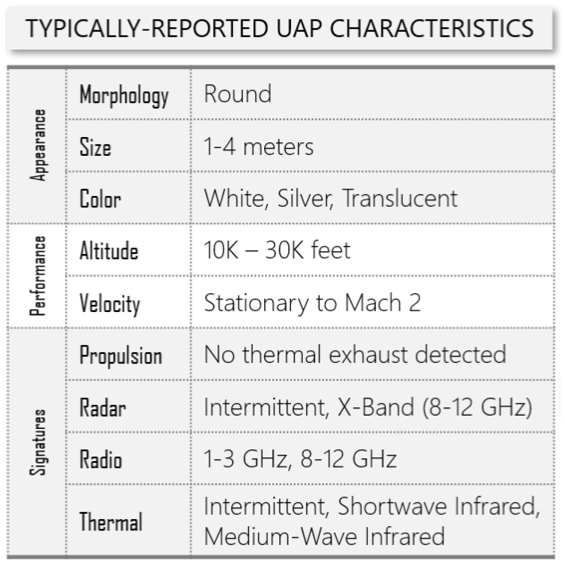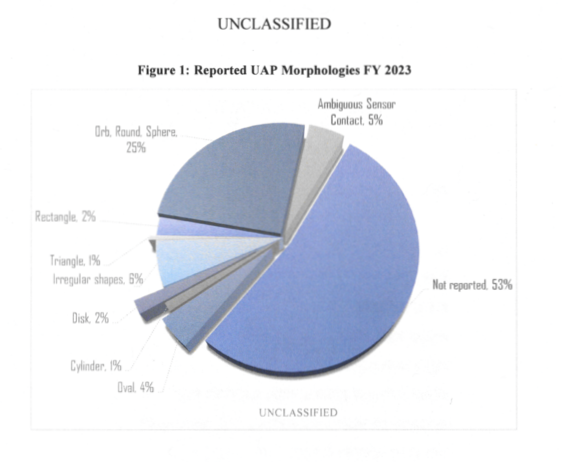by Steven Richards
On Tuesday, the U.S. Department of Defense publicly released the 2023 report on Unidentified Anomalous Phenomena (UAP)—colloquially known as UFOs—which revealed that there have been almost 300 reports of potential UAP observed, with some cases of UAP exhibiting “high-speed travel or unusual maneuverability.”
The report, titled “Fiscal Year 2023 Consolidated Annual Report on Unidentified Anomalous Phenomena” was released by the Department of Defense for open publication along with charts detailing trends in UAP reporting which included the typically-reported characteristics of the objects as well as a heat map their locations.
You can read the unclassified report here.
The reports of unidentified objects were collected by the All-domain Anomaly Resolution Office (AARO), an office established in July 2022 to “minimize technical and intelligence surprise” that unidentified aerial phenomena could pose and which is headed by Dr. Sean Kirkpatrick. According to the report, the AARO received a total of 291 UAP reports since the fiscal year began in August 2022.
The document noted that many of the UAP reports have occurred in the United States. “Most reports still reflect a bias towards restricted military airspace, as a result of reporting from military personnel and sensors present in such areas,” the executive summary reads. “This bias has been lessened by reporting from commercial pilots showing a more diverse geographic distribution of UAP sightings across the United States,” it continues.
A heat map included in the report shows the hotspots of UAP reports for the year. Although the vast majority of UAP reports filed to the AARO were from the United States, the heat map shows that sightings are also clustered around the East Asia region, near China, the Korean Peninsula and Japan, as well as the Middle East. The U.S. maintains significant military presence in these areas.
Other charts released alongside the report detail the UAP reporting trends. These unidentified objects are most commonly reported as “round,” between 1-4 meters in length, and are either white, silver, or translucent. Another puzzling feature of most commonly reported UAP is the apparent lack of thermal exhaust, used in modern aircraft to vent the air from the engine. It is a vital component that permits an aircraft to fly without overheating.

Department of Defense Presentation on 2023 UAP Report This chart was obtained from the Fiscal Year 2023 Consolidated Annual Report on Unidentified Anomalous Phenomena, released by the Pentagon on Oct. 17, 2023.
A pie chart embedded in the report shows the distribution of characteristics among the reported UAP contacts. A majority, 53%, did not have a reported morphology—or form. Among those with reported characteristics, 25% were reported as and “orb” or “round, while the remainder were reported as other shapes, varying from triangles to cylinders. A small portion were reported as “ambiguous censor contacts.” A vast majority of UAP were reported as having “no lights” at 79%.
Earlier this year, a whistleblower claimed that the United States had “a multi-decade UAP crash retrieval and reverse-engineering program” in testimony before congressional investigators from the House Oversight Committee’s national security subcommittee. The whistleblower, David Grusch, is a former Air Force and intelligence official who has accused the U.S. government of a coverup of its UAP program.
Another witness who testified at the hearing, Retired Navy Commander and David Fravor, a fighter pilot, told the committee that a UAP he encountered in 2004 on a training mission aboard the carrier USS Nimitz—depicted in the famous Tic-Tac video that circled the internet—was “perfectly white, smooth, no windows” and that it “did not operate with any of the known aerodynamic principles that we expect for objects that fly in our atmosphere.” He described the object changing speed and direction at a rapid pace, in one instance traveling 60 miles in under a minute.
That converts to 3,600 mph: approximately 4.6 times the speed of sound.
There are still many unanswered questions about UAP. If reports about these flying objects’ unusual patterns of movement and technological capability are reliable, how are they being flown? Another key question is where are they coming from? The new report from the Defense Department does not address these pressing questions.
“We’re jumping through a lot of hoops to get this information,” Will Hampson, a spokesman for Representative Nancy Mace, R-S.C., who sits on the subcommittee investigating UAP, told Just the News on Thursday. “It is a huge priority for Rep. Mace. We look forward to member briefings on the subject and hope the Pentagon will be forthcoming and transparent so the public knows what’s going on,” he continued.
The report claims that the AARO is making progress in collecting and identifying reported UAP. The “unidentified nature” of most of these objects stems from the fact that there are gaps in the United States’ data collection abilities with regard to UAP—meaning insufficient data has been obtained from things like radar and sensors to properly identify the phenomena.
The report concludes that “with an increased quality of data secured, the unidentified and purported anomalous nature of most UAP will likely resolve to ordinary phenomena and significantly reduce the amount of UAP case submissions.” The AARO seems confident that many UAP reports will be resolved by better observation, showing them to be normal, explainable phenomena.
As an example, the Defense Department attached a resolved AARO case report. In this case, military personnel reported a potential UAP incursion into restricted airspace, identified as “equidistant lights that flew at a relatively constant pace.” An AARO analysis determined that these lights were actually commercial aircraft that the observers incorrectly estimated them to be much closer to the sensor than they actually were. The image taken of the purported UAP was also distorted due to sensor vibration, according to the report.
– – –
Steven Richards joined Just the News in August 2023 after previously working as a Research Analyst for the Government Accountability Institute (GAI) in Tallahassee, Florida.









